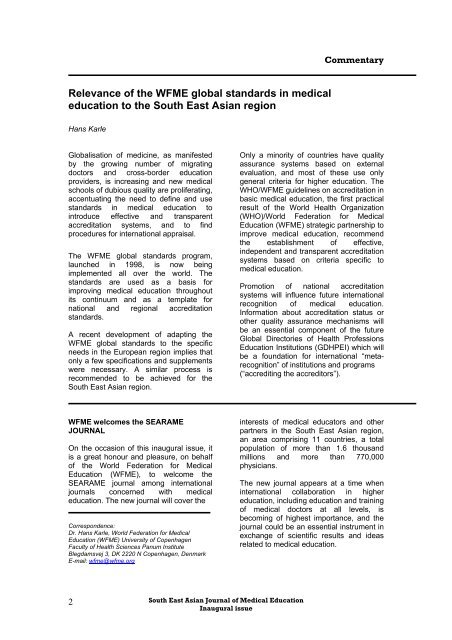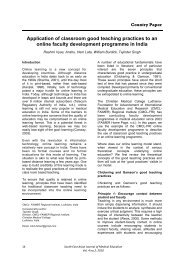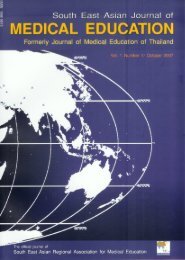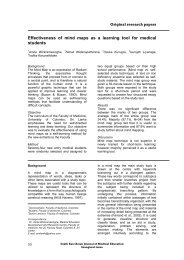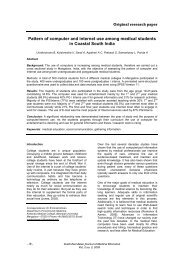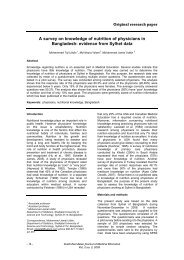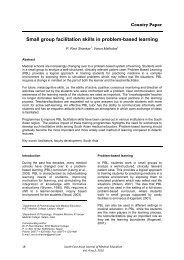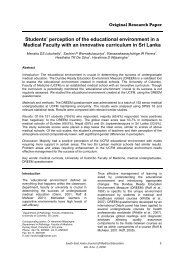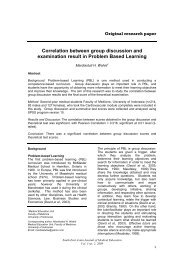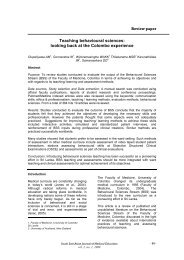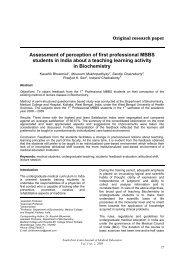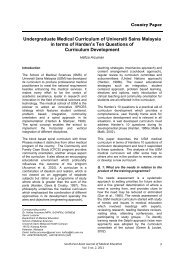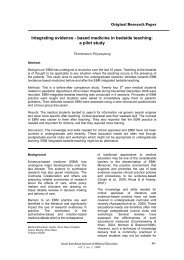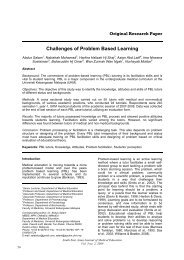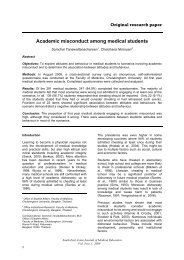Relevance of the WFME global standards in medical education to ...
Relevance of the WFME global standards in medical education to ...
Relevance of the WFME global standards in medical education to ...
You also want an ePaper? Increase the reach of your titles
YUMPU automatically turns print PDFs into web optimized ePapers that Google loves.
Commentary<br />
<strong>Relevance</strong> <strong>of</strong> <strong>the</strong> <strong>WFME</strong> <strong>global</strong> <strong>standards</strong> <strong>in</strong> <strong>medical</strong><br />
<strong>education</strong> <strong>to</strong> <strong>the</strong> South East Asian region<br />
Hans Karle<br />
Globalisation <strong>of</strong> medic<strong>in</strong>e, as manifested<br />
by <strong>the</strong> grow<strong>in</strong>g number <strong>of</strong> migrat<strong>in</strong>g<br />
doc<strong>to</strong>rs and cross-border <strong>education</strong><br />
providers, is <strong>in</strong>creas<strong>in</strong>g and new <strong>medical</strong><br />
schools <strong>of</strong> dubious quality are proliferat<strong>in</strong>g,<br />
accentuat<strong>in</strong>g <strong>the</strong> need <strong>to</strong> def<strong>in</strong>e and use<br />
<strong>standards</strong> <strong>in</strong> <strong>medical</strong> <strong>education</strong> <strong>to</strong><br />
<strong>in</strong>troduce effective and transparent<br />
accreditation systems, and <strong>to</strong> f<strong>in</strong>d<br />
procedures for <strong>in</strong>ternational appraisal.<br />
The <strong>WFME</strong> <strong>global</strong> <strong>standards</strong> program,<br />
launched <strong>in</strong> 1998, is now be<strong>in</strong>g<br />
implemented all over <strong>the</strong> world. The<br />
<strong>standards</strong> are used as a basis for<br />
improv<strong>in</strong>g <strong>medical</strong> <strong>education</strong> throughout<br />
its cont<strong>in</strong>uum and as a template for<br />
national and regional accreditation<br />
<strong>standards</strong>.<br />
A recent development <strong>of</strong> adapt<strong>in</strong>g <strong>the</strong><br />
<strong>WFME</strong> <strong>global</strong> <strong>standards</strong> <strong>to</strong> <strong>the</strong> specific<br />
needs <strong>in</strong> <strong>the</strong> European region implies that<br />
only a few specifications and supplements<br />
were necessary. A similar process is<br />
recommended <strong>to</strong> be achieved for <strong>the</strong><br />
South East Asian region.<br />
Only a m<strong>in</strong>ority <strong>of</strong> countries have quality<br />
assurance systems based on external<br />
evaluation, and most <strong>of</strong> <strong>the</strong>se use only<br />
general criteria for higher <strong>education</strong>. The<br />
WHO/<strong>WFME</strong> guidel<strong>in</strong>es on accreditation <strong>in</strong><br />
basic <strong>medical</strong> <strong>education</strong>, <strong>the</strong> first practical<br />
result <strong>of</strong> <strong>the</strong> World Health Organization<br />
(WHO)/World Federation for Medical<br />
Education (<strong>WFME</strong>) strategic partnership <strong>to</strong><br />
improve <strong>medical</strong> <strong>education</strong>, recommend<br />
<strong>the</strong> establishment <strong>of</strong> effective,<br />
<strong>in</strong>dependent and transparent accreditation<br />
systems based on criteria specific <strong>to</strong><br />
<strong>medical</strong> <strong>education</strong>.<br />
Promotion <strong>of</strong> national accreditation<br />
systems will <strong>in</strong>fluence future <strong>in</strong>ternational<br />
recognition <strong>of</strong> <strong>medical</strong> <strong>education</strong>.<br />
Information about accreditation status or<br />
o<strong>the</strong>r quality assurance mechanisms will<br />
be an essential component <strong>of</strong> <strong>the</strong> future<br />
Global Direc<strong>to</strong>ries <strong>of</strong> Health Pr<strong>of</strong>essions<br />
Education Institutions (GDHPEI) which will<br />
be a foundation for <strong>in</strong>ternational “metarecognition”<br />
<strong>of</strong> <strong>in</strong>stitutions and programs<br />
(“accredit<strong>in</strong>g <strong>the</strong> accredi<strong>to</strong>rs”).<br />
<strong>WFME</strong> welcomes <strong>the</strong> SEARAME<br />
JOURNAL<br />
On <strong>the</strong> occasion <strong>of</strong> this <strong>in</strong>augural issue, it<br />
is a great honour and pleasure, on behalf<br />
<strong>of</strong> <strong>the</strong> World Federation for Medical<br />
Education (<strong>WFME</strong>), <strong>to</strong> welcome <strong>the</strong><br />
SEARAME journal among <strong>in</strong>ternational<br />
journals concerned with <strong>medical</strong><br />
<strong>education</strong>. The new journal will cover <strong>the</strong><br />
Correspondence:<br />
Dr. Hans Karle, World Federation for Medical<br />
Education (<strong>WFME</strong>) University <strong>of</strong> Copenhagen<br />
Faculty <strong>of</strong> Health Sciences Panum Institute<br />
Blegdamsvej 3, DK 2220 N Copenhagen, Denmark<br />
E-mail: wfme@wfme.org<br />
<strong>in</strong>terests <strong>of</strong> <strong>medical</strong> educa<strong>to</strong>rs and o<strong>the</strong>r<br />
partners <strong>in</strong> <strong>the</strong> South East Asian region,<br />
an area compris<strong>in</strong>g 11 countries, a <strong>to</strong>tal<br />
population <strong>of</strong> more than 1.6 thousand<br />
millions and more than 770,000<br />
physicians.<br />
The new journal appears at a time when<br />
<strong>in</strong>ternational collaboration <strong>in</strong> higher<br />
<strong>education</strong>, <strong>in</strong>clud<strong>in</strong>g <strong>education</strong> and tra<strong>in</strong><strong>in</strong>g<br />
<strong>of</strong> <strong>medical</strong> doc<strong>to</strong>rs at all levels, is<br />
becom<strong>in</strong>g <strong>of</strong> highest importance, and <strong>the</strong><br />
journal could be an essential <strong>in</strong>strument <strong>in</strong><br />
exchange <strong>of</strong> scientific results and ideas<br />
related <strong>to</strong> <strong>medical</strong> <strong>education</strong>.<br />
2<br />
South East Asian Journal <strong>of</strong> Medical Education<br />
Inaugural issue
Need for <strong>standards</strong> <strong>in</strong> <strong>medical</strong><br />
<strong>education</strong><br />
The <strong>in</strong>creas<strong>in</strong>g <strong>in</strong>ternationalisation <strong>of</strong> <strong>the</strong><br />
<strong>medical</strong> pr<strong>of</strong>ession raises <strong>the</strong> question <strong>of</strong><br />
safeguard<strong>in</strong>g <strong>the</strong> practice <strong>of</strong> medic<strong>in</strong>e and<br />
<strong>the</strong> use <strong>of</strong> <strong>the</strong> <strong>medical</strong> workforce.<br />
With<strong>in</strong> <strong>the</strong> framework <strong>of</strong> <strong>global</strong>isation and<br />
cross-border <strong>education</strong>, we have observed<br />
pronounced migration <strong>of</strong> <strong>medical</strong> doc<strong>to</strong>rs.<br />
As a consequence <strong>of</strong> this development,<br />
commercialisation and privatisation and<br />
even a for-pr<strong>of</strong>it approach <strong>of</strong> <strong>education</strong><br />
providers have become realities. Medical<br />
<strong>education</strong> thus follows <strong>the</strong> conditions <strong>of</strong><br />
o<strong>the</strong>r parts <strong>of</strong> higher <strong>education</strong>, becom<strong>in</strong>g<br />
a trade commodity with <strong>the</strong> risk <strong>of</strong><br />
compromis<strong>in</strong>g quality. This fact has<br />
brought about renewed <strong>in</strong>terest <strong>in</strong> quality<br />
assurance mechanisms, exemplified <strong>in</strong><br />
greater concern about standard sett<strong>in</strong>g<br />
and establishment <strong>of</strong> accreditation<br />
systems, and a number <strong>of</strong> <strong>in</strong>ternational<br />
organisations and agencies are now<br />
work<strong>in</strong>g with <strong>the</strong>se issues.<br />
The need <strong>to</strong> def<strong>in</strong>e <strong>global</strong> <strong>standards</strong> <strong>in</strong><br />
<strong>medical</strong> <strong>education</strong> arises from <strong>the</strong><br />
implications <strong>of</strong> this <strong>global</strong>isation process,<br />
but also from an attempt <strong>to</strong> meet national<br />
problems and challenges due <strong>to</strong><br />
<strong>in</strong>stitutional conservatism and <strong>in</strong>sufficient<br />
management and leadership.<br />
One paramount world-wide problem is <strong>the</strong><br />
mushroom<strong>in</strong>g <strong>of</strong> new <strong>medical</strong> schools <strong>of</strong><br />
about 100 per year over <strong>the</strong> last 10 years.<br />
This development has serious<br />
consequences <strong>in</strong> many new <strong>medical</strong><br />
schools due <strong>to</strong> unclear mission<br />
statements, <strong>in</strong>sufficient <strong>education</strong>al<br />
resources, lack <strong>of</strong> cl<strong>in</strong>ical tra<strong>in</strong><strong>in</strong>g sett<strong>in</strong>gs,<br />
and limited research atta<strong>in</strong>ment. The lack<br />
<strong>of</strong> accreditation procedures or o<strong>the</strong>r quality<br />
assurance mechanisms <strong>in</strong> many countries<br />
adds <strong>to</strong> <strong>the</strong> disquiet.<br />
The <strong>WFME</strong> <strong>global</strong> <strong>standards</strong><br />
programme<br />
The <strong>WFME</strong> launched its ambitious<br />
programme on <strong>in</strong>ternational <strong>standards</strong> <strong>in</strong><br />
<strong>medical</strong> <strong>education</strong> <strong>in</strong> a <strong>WFME</strong> executive<br />
council position paper published <strong>in</strong> 1998<br />
(<strong>WFME</strong>, 1998).<br />
The work<strong>in</strong>g process consisted <strong>of</strong> three<br />
<strong>in</strong>ternational task forces with all <strong>to</strong>ge<strong>the</strong>r<br />
76 experts represent<strong>in</strong>g all five cont<strong>in</strong>ents.<br />
Members <strong>of</strong> <strong>the</strong> Task Forces were<br />
selected on <strong>the</strong> basis <strong>of</strong> <strong>the</strong>ir expertise.<br />
The trilogy <strong>of</strong> <strong>global</strong> <strong>standards</strong> for quality<br />
improvement <strong>in</strong> <strong>medical</strong> <strong>education</strong>,<br />
cover<strong>in</strong>g basic <strong>medical</strong> <strong>education</strong> (BME),<br />
postgraduate <strong>medical</strong> <strong>education</strong> (PME)<br />
and cont<strong>in</strong>u<strong>in</strong>g pr<strong>of</strong>essional development<br />
(CPD) <strong>of</strong> <strong>medical</strong> doc<strong>to</strong>rs and published <strong>in</strong><br />
2003 (<strong>WFME</strong>, 2003) was <strong>the</strong> essential<br />
background material for <strong>the</strong> 2003 <strong>WFME</strong><br />
world conference <strong>in</strong> <strong>medical</strong> <strong>education</strong><br />
entitled: Global <strong>standards</strong> <strong>in</strong> <strong>medical</strong><br />
<strong>education</strong> for better health care. The<br />
conference resulted <strong>in</strong> consensus<br />
worldwide on <strong>the</strong> <strong>standards</strong> programme<br />
(van Niekerk, 2003; van Niekerk et al.,<br />
2003) and gave <strong>WFME</strong> a renewed<br />
mandate. The implementation process has<br />
been ongo<strong>in</strong>g s<strong>in</strong>ce 2001, compris<strong>in</strong>g pilot<br />
studies, translation (<strong>the</strong> BME Standards<br />
have been translated <strong>in</strong><strong>to</strong> more than 20<br />
languages), basis for self-evaluation and<br />
external reviews <strong>of</strong> <strong>education</strong>al <strong>in</strong>stitutions<br />
and <strong>in</strong>corporation <strong>in</strong> national <strong>standards</strong><br />
and accreditation systems around <strong>the</strong><br />
world. More than 250 <strong>medical</strong> schools<br />
have used <strong>the</strong> <strong>standards</strong> directly and more<br />
than 60 countries use <strong>the</strong> <strong>WFME</strong><br />
<strong>standards</strong> as a reference <strong>in</strong> national<br />
standard sett<strong>in</strong>g.<br />
In def<strong>in</strong><strong>in</strong>g <strong>global</strong> <strong>standards</strong>, dissimilarities<br />
between regions and countries regard<strong>in</strong>g<br />
<strong>the</strong> basic conditions and management <strong>of</strong><br />
<strong>medical</strong> <strong>education</strong> must be taken <strong>in</strong><strong>to</strong><br />
consideration. The <strong>WFME</strong> task forces also<br />
discussed <strong>the</strong> “pros” and “cons” <strong>of</strong><br />
standard sett<strong>in</strong>g. Among <strong>the</strong> advantages<br />
enumerated were <strong>in</strong>centive for<br />
improvement, basis for national<br />
evaluation, formulation <strong>of</strong> curricular<br />
essentials (core), opportunity for <strong>education</strong><br />
research, facilitation <strong>of</strong> reforms, <strong>in</strong>strument<br />
for fund<strong>in</strong>g, facilitation <strong>of</strong> exchange<br />
(students/teachers/programmes) and<br />
foundation for accreditation. On <strong>the</strong> o<strong>the</strong>r<br />
hand, reservations were also expressed,<br />
<strong>the</strong> most important ones be<strong>in</strong>g<br />
<strong>in</strong>terference with au<strong>to</strong>nomy, focus on<br />
m<strong>in</strong>imum requirements, risk <strong>of</strong> conformity,<br />
sense <strong>of</strong> control, lack <strong>of</strong> common<br />
relevance, disregard <strong>of</strong> local differences,<br />
equation <strong>of</strong> “<strong>global</strong>” and “western” and <strong>the</strong><br />
risk <strong>of</strong> <strong>in</strong>creas<strong>in</strong>g bra<strong>in</strong> dra<strong>in</strong>. Balanc<strong>in</strong>g<br />
<strong>the</strong>se views, <strong>the</strong> task forces came <strong>to</strong> <strong>the</strong><br />
conclusion that time was ripe for common<br />
<strong>global</strong> <strong>standards</strong> for <strong>medical</strong> <strong>education</strong> <strong>to</strong><br />
be explored.<br />
South East Asian Journal <strong>of</strong> Medical Education<br />
Inaugural issue<br />
3
Specify<strong>in</strong>g <strong>global</strong> <strong>standards</strong> <strong>in</strong> any<br />
restricted sense could exert <strong>in</strong>sufficient<br />
impact, and <strong>in</strong>deed such <strong>standards</strong> have<br />
<strong>the</strong> potential <strong>to</strong> lower <strong>the</strong> quality <strong>of</strong> <strong>medical</strong><br />
<strong>education</strong> <strong>in</strong> some places. Thus, a lever<br />
for change and reform had essentially <strong>to</strong><br />
be <strong>in</strong>corporated. This was <strong>the</strong> background<br />
for <strong>the</strong> concept <strong>of</strong> <strong>the</strong> <strong>WFME</strong> Standards <strong>to</strong><br />
be framed <strong>to</strong> specify atta<strong>in</strong>ment at two<br />
levels.<br />
(a) Basic <strong>standards</strong> <strong>to</strong> be met from <strong>the</strong><br />
outset and useful for accreditation<br />
(b) Standards for quality development <strong>in</strong><br />
accordance with <strong>in</strong>ternational consensus<br />
about best practice and essential <strong>in</strong> reform<br />
processes.<br />
The <strong>WFME</strong> <strong>standards</strong> are formulated at<br />
<strong>the</strong> <strong>in</strong>stitutional and <strong>education</strong>al<br />
programme level deal<strong>in</strong>g with all relevant<br />
aspects <strong>of</strong> structure and organisation <strong>of</strong><br />
<strong>the</strong> <strong>in</strong>stitution, <strong>the</strong> curriculum, its content<br />
and <strong>the</strong> process <strong>of</strong> <strong>education</strong>, <strong>the</strong> learn<strong>in</strong>g<br />
environment, <strong>the</strong> outcome competencies<br />
and <strong>the</strong> management <strong>of</strong> <strong>education</strong>. They<br />
are structured <strong>in</strong> n<strong>in</strong>e areas (each with<br />
around 35 sub-areas) for each <strong>of</strong> <strong>the</strong> three<br />
phases <strong>of</strong> <strong>medical</strong> <strong>education</strong> (Table. 1).<br />
Table 1: <strong>WFME</strong> Trilogy <strong>of</strong> Standards: Areas<br />
Basic <strong>medical</strong> <strong>education</strong><br />
1. Mission and objectives<br />
2. Educational program<br />
3. Assessment <strong>of</strong> students<br />
4. Students<br />
5. Academic staff/faculty<br />
6. Educational resources<br />
7. Program evaluation<br />
8. Governance and<br />
adm<strong>in</strong>istration<br />
9. Cont<strong>in</strong>uous renewal<br />
Postgraduate <strong>medical</strong><br />
<strong>education</strong><br />
1. Mission and outcomes<br />
2. Tra<strong>in</strong><strong>in</strong>g process<br />
3. Assessment <strong>of</strong> tra<strong>in</strong>ees<br />
4. Tra<strong>in</strong>ees<br />
5. Staff<strong>in</strong>g<br />
6. Tra<strong>in</strong><strong>in</strong>g sett<strong>in</strong>gs and<br />
<strong>education</strong>al resources<br />
7. Evaluation <strong>of</strong><br />
tra<strong>in</strong><strong>in</strong>g process<br />
8. Governance and<br />
adm<strong>in</strong>istration<br />
9. Cont<strong>in</strong>uous renewal<br />
Cont<strong>in</strong>u<strong>in</strong>g pr<strong>of</strong>essional<br />
development (CPD)<br />
1. Mission and outcomes<br />
2. Learn<strong>in</strong>g methods<br />
3. Plann<strong>in</strong>g and documentation<br />
4. The Individual doc<strong>to</strong>r<br />
5. CPD providers<br />
6. Educational context<br />
and resources<br />
7. Evaluation <strong>of</strong> methods<br />
and competencies<br />
8. organization<br />
9. Cont<strong>in</strong>uous renewal<br />
4<br />
South East Asian Journal <strong>of</strong> Medical Education<br />
Inaugural issue
Adaptation <strong>to</strong> Regional requirements<br />
A European task force under <strong>the</strong> <strong>the</strong>matic<br />
network MEDINE, sponsored by <strong>the</strong><br />
European Union, recently came <strong>to</strong> <strong>the</strong><br />
conclusion that <strong>the</strong>re is presently no need<br />
for a separate set <strong>of</strong> European <strong>standards</strong><br />
<strong>in</strong> <strong>medical</strong> <strong>education</strong>. The <strong>in</strong>creas<strong>in</strong>g<br />
collaboration between countries, a<br />
spectrum <strong>of</strong> diversity <strong>of</strong> <strong>medical</strong> <strong>education</strong><br />
comparable <strong>to</strong> o<strong>the</strong>r regions <strong>of</strong> <strong>the</strong> world,<br />
<strong>the</strong> regional perspectives <strong>in</strong> a broader<br />
<strong>global</strong> context and type <strong>of</strong> <strong>standards</strong><br />
needed <strong>in</strong> <strong>medical</strong> <strong>education</strong>, all led <strong>to</strong><br />
rejection <strong>of</strong> a concept <strong>of</strong> separate<br />
<strong>standards</strong> for Europe as an <strong>in</strong>termediary<br />
level between <strong>global</strong> and national<br />
<strong>standards</strong> <strong>in</strong> <strong>the</strong> region.<br />
The only th<strong>in</strong>g needed would be <strong>to</strong> add<br />
regional specifications for <strong>the</strong> <strong>WFME</strong><br />
<strong>global</strong> <strong>standards</strong>. Elements <strong>of</strong> such<br />
specifications were <strong>the</strong> chang<strong>in</strong>g <strong>of</strong><br />
division l<strong>in</strong>es between basic <strong>standards</strong> or<br />
m<strong>in</strong>imum requirements on one site, and<br />
<strong>standards</strong> for quality development on <strong>the</strong><br />
o<strong>the</strong>r site. Supplements necessitated by<br />
<strong>the</strong> special European conditions as<br />
consequence <strong>of</strong> e.g. <strong>the</strong> EU directives on<br />
<strong>medical</strong> <strong>education</strong> or determ<strong>in</strong>ed by<br />
commitment <strong>to</strong> <strong>the</strong> European higher<br />
<strong>education</strong> area, <strong>in</strong>clud<strong>in</strong>g <strong>the</strong> so- called<br />
Bologna process or o<strong>the</strong>r <strong>in</strong>itiatives, were<br />
also added.<br />
Based on this work, European<br />
specifications for <strong>the</strong> <strong>WFME</strong> <strong>global</strong><br />
<strong>standards</strong> for quality Improvement <strong>of</strong><br />
<strong>medical</strong> <strong>education</strong> were recently published<br />
(<strong>WFME</strong>, 2007) and are thought <strong>to</strong> be<br />
usable as a template for national<br />
<strong>standards</strong> <strong>in</strong> <strong>the</strong> region.<br />
Obviously, a similar argumentation could<br />
be utilised <strong>in</strong> <strong>the</strong> South East Asian region,<br />
and I would encourage <strong>the</strong> SEARAME <strong>to</strong><br />
take responsibility for explor<strong>in</strong>g <strong>the</strong><br />
relevance <strong>of</strong> a process <strong>of</strong> adaptation <strong>of</strong> <strong>the</strong><br />
<strong>global</strong> <strong>standards</strong> <strong>to</strong> <strong>the</strong> needs <strong>of</strong> this<br />
Region. The exam<strong>in</strong>ation recently<br />
conducted with European spectacles has<br />
demonstrated that <strong>the</strong> <strong>WFME</strong> <strong>standards</strong>,<br />
although now be<strong>in</strong>g more than 5 years old,<br />
do not need a revision at <strong>the</strong> moment.<br />
Use <strong>of</strong> <strong>standards</strong> and <strong>the</strong> concept <strong>of</strong><br />
accreditation<br />
The primary <strong>in</strong>tention <strong>of</strong> <strong>WFME</strong> was <strong>to</strong><br />
provide a new framework aga<strong>in</strong>st which<br />
<strong>medical</strong> schools and o<strong>the</strong>r <strong>education</strong>al<br />
<strong>in</strong>stitutions and providers could measure<br />
<strong>the</strong>mselves <strong>in</strong> <strong>in</strong>stitutional self-evaluation<br />
and self-improvement processes. Such<br />
procedures should be fur<strong>the</strong>r developed<br />
by <strong>in</strong>clusion <strong>of</strong> evaluation and counsell<strong>in</strong>g<br />
from external peer review committees.<br />
However, from <strong>the</strong> beg<strong>in</strong>n<strong>in</strong>g, it was also<br />
stated that <strong>global</strong> <strong>standards</strong> could be used<br />
as a template for national and regional<br />
<strong>standards</strong> with <strong>the</strong> necessary<br />
specifications as mentioned above, <strong>to</strong> be<br />
used as criteria for agencies deal<strong>in</strong>g with<br />
recognition and accreditation <strong>of</strong> <strong>medical</strong><br />
schools and o<strong>the</strong>r <strong>education</strong>al <strong>in</strong>stitutions<br />
and <strong>the</strong>ir programmes.<br />
Quality assurance and accreditation<br />
systems for higher <strong>education</strong> based on<br />
external review are presently adopted <strong>in</strong><br />
somewhat more than 70 countries. The<br />
exist<strong>in</strong>g systems vary from country <strong>to</strong><br />
country and sometimes even with<strong>in</strong><br />
countries. For example, some countries<br />
only have one system for all higher<br />
<strong>education</strong>, whereas o<strong>the</strong>rs use a<br />
comb<strong>in</strong>ation <strong>of</strong> evaluation based on<br />
general higher <strong>education</strong> criteria and<br />
pr<strong>of</strong>ession-specific <strong>education</strong> criteria. A<br />
new problem is that most systems only<br />
cover national providers leav<strong>in</strong>g crossborder<br />
<strong>education</strong> providers outside any<br />
control.<br />
Recommendations for proper accreditation<br />
systems can be found <strong>in</strong> <strong>the</strong> WHO/<strong>WFME</strong><br />
guidel<strong>in</strong>es for accreditation <strong>in</strong> basic<br />
<strong>medical</strong> <strong>education</strong>, published <strong>in</strong><br />
2005(WHO & <strong>WFME</strong>, 2005) as a result <strong>of</strong><br />
an <strong>in</strong>ternational task force with broad<br />
representation from all regions. This was<br />
<strong>the</strong> first practical result <strong>of</strong> <strong>the</strong> 2004<br />
strategic partnership between <strong>the</strong> World<br />
Health Organization (WHO) and <strong>the</strong><br />
<strong>WFME</strong> <strong>to</strong> improve <strong>medical</strong> <strong>education</strong><br />
(WHO & <strong>WFME</strong>, 2004). Ano<strong>the</strong>r result <strong>of</strong><br />
<strong>the</strong> WHO/<strong>WFME</strong> task force was <strong>the</strong><br />
recommendation, that accreditation should<br />
foremost be considered a national<br />
responsibility, <strong>the</strong> exemption be<strong>in</strong>g<br />
countries with only one or a few <strong>medical</strong><br />
schools, entail<strong>in</strong>g difficulties regard<strong>in</strong>g <strong>the</strong><br />
<strong>in</strong>dependence and externality <strong>of</strong> experts.<br />
Such conditions would require affiliation<br />
with an accreditation system <strong>in</strong> a<br />
neighbour<strong>in</strong>g country or establishment <strong>of</strong><br />
regional or sub-regional accreditation<br />
systems.<br />
South East Asian Journal <strong>of</strong> Medical Education<br />
Inaugural issue<br />
5
The WHO/<strong>WFME</strong> guidel<strong>in</strong>es are<br />
formulated as flexible recommendations<br />
and cover fundamental requirements, <strong>the</strong><br />
legal framework, <strong>the</strong> organisational<br />
structure, <strong>the</strong> <strong>standards</strong> or criteria <strong>to</strong> be<br />
used, <strong>the</strong> process and types <strong>of</strong> decision,<br />
<strong>the</strong> question <strong>of</strong> public announcement and<br />
comments on <strong>the</strong> benefits <strong>of</strong> us<strong>in</strong>g<br />
accreditation. Accreditation systems must<br />
be trustworthy and recognised by all, i.e.<br />
<strong>the</strong> <strong>medical</strong> schools, students, <strong>the</strong><br />
pr<strong>of</strong>ession, <strong>the</strong> health care system and <strong>the</strong><br />
public. Trust must be based on <strong>the</strong><br />
academic competence, efficiency and<br />
fairness <strong>of</strong> <strong>the</strong> system and <strong>the</strong> system<br />
must possess a high degree <strong>of</strong><br />
transparency.<br />
With<strong>in</strong> <strong>the</strong> framework <strong>of</strong> <strong>the</strong> WHO/<strong>WFME</strong><br />
strategic partnership, <strong>WFME</strong> recently<br />
formulated a programme for promotion <strong>of</strong><br />
accreditation (<strong>WFME</strong>, 2005). Essential <strong>in</strong><br />
this development was <strong>the</strong> def<strong>in</strong>ition <strong>of</strong> a<br />
<strong>WFME</strong> advisor function by an <strong>in</strong>ternational<br />
task force (<strong>WFME</strong>, 2005).<br />
International recognition <strong>of</strong> <strong>medical</strong><br />
<strong>education</strong> programmes<br />
International recognition <strong>of</strong> <strong>medical</strong><br />
<strong>education</strong> programmes will be beneficial <strong>to</strong><br />
<strong>medical</strong> students, <strong>medical</strong> teachers,<br />
<strong>medical</strong> schools/colleges and health care<br />
authorities, at local, national and<br />
<strong>in</strong>ternational levels, and will safeguard <strong>the</strong><br />
<strong>in</strong>terests <strong>of</strong> <strong>the</strong> public.<br />
Fur<strong>the</strong>r debate is needed on how <strong>to</strong><br />
achieve reliable and valid <strong>in</strong>ternational<br />
recognition <strong>of</strong> <strong>medical</strong> <strong>education</strong><br />
<strong>in</strong>stitutions and programmes. In some<br />
parts <strong>of</strong> <strong>the</strong> world, accreditation <strong>of</strong><br />
<strong>education</strong> is still not an accepted<br />
procedure and o<strong>the</strong>r means <strong>of</strong> quality<br />
assurance is used, e.g. central evaluation<br />
<strong>of</strong> programmes without <strong>in</strong>stitutional selfevaluation<br />
or site visits. Quality issues are<br />
also controlled by selection procedures,<br />
entrance exam<strong>in</strong>ations, centrally regulated<br />
curricula, self-evaluation and <strong>in</strong>spections<br />
organised by <strong>the</strong> <strong>in</strong>stitution itself, use <strong>of</strong><br />
external exam<strong>in</strong>ers and national<br />
exam<strong>in</strong>ations before licensure.<br />
In conclusion, apart from quality<br />
assurance <strong>of</strong> <strong>medical</strong> <strong>education</strong> through<br />
national accreditation o<strong>the</strong>r mechanisms<br />
for <strong>in</strong>ternational recognition <strong>of</strong> <strong>medical</strong><br />
<strong>education</strong> programmes are needed.<br />
Over <strong>the</strong> last years, WHO has considered<br />
<strong>the</strong> future <strong>of</strong> <strong>the</strong> World Direc<strong>to</strong>ry <strong>of</strong><br />
Medical Schools (WHO, 2003) and has<br />
now decided that new Global Direc<strong>to</strong>ries<br />
for Health Pr<strong>of</strong>essions Education<br />
Institutions (GDHPEI) should be<br />
developed. One objective is <strong>to</strong> establish<br />
and streng<strong>the</strong>n national accreditation and<br />
<strong>to</strong> <strong>in</strong>crease <strong>the</strong> amount <strong>of</strong> <strong>in</strong>formation<br />
about <strong>in</strong>stitutions and programmes,<br />
<strong>in</strong>clud<strong>in</strong>g number <strong>of</strong> admissions and<br />
graduates, attrition rate, ownership,<br />
management and fund<strong>in</strong>g sources, and,<br />
most important, <strong>to</strong> add quality related<br />
<strong>in</strong>formation, e.g. about accreditation status<br />
(operat<strong>in</strong>g agency, <strong>the</strong> criteria used, type<br />
<strong>of</strong> procedure, etc) or o<strong>the</strong>r quality<br />
assurance mechanisms.<br />
In August 2007, an agreement was signed<br />
between WHO and <strong>the</strong> University <strong>of</strong><br />
Copenhagen <strong>in</strong> Denmark, which implies<br />
that <strong>the</strong> responsibility for develop<strong>in</strong>g and<br />
runn<strong>in</strong>g this database will be taken over by<br />
<strong>the</strong> University <strong>of</strong> Copenhagen with <strong>the</strong><br />
assistance <strong>of</strong> <strong>the</strong> <strong>WFME</strong>.<br />
The plan described will au<strong>to</strong>matically lead<br />
<strong>to</strong> a system <strong>of</strong> meta-recognition <strong>of</strong><br />
accredited <strong>medical</strong> schools. The approach<br />
<strong>of</strong> “accredit<strong>in</strong>g <strong>the</strong> accredi<strong>to</strong>rs” will<br />
stimulate establishment <strong>of</strong> national<br />
accreditation systems, respect <strong>the</strong> work<br />
already be<strong>in</strong>g done by exist<strong>in</strong>g reliable<br />
accreditation agencies, and avoid<br />
unnecessary bureaucracy.<br />
References<br />
Van Niekerk, JP de V. (2003) “<strong>WFME</strong> <strong>global</strong><br />
<strong>standards</strong> receive r<strong>in</strong>g<strong>in</strong>g endorsement”, Medical<br />
Education, 37, pp 585-6.<br />
Van Niekerk, JP de V, Christensen, L., Karle, H.,<br />
L<strong>in</strong>dgren, S., & Nystrup, J. (2003) “<strong>WFME</strong> <strong>global</strong><br />
<strong>standards</strong> <strong>in</strong> <strong>medical</strong> <strong>education</strong>: status and<br />
perspectives follow<strong>in</strong>g <strong>the</strong> <strong>WFME</strong> World<br />
Conference”. Medical Education, 37, pp 1050-4.<br />
World Federation for Medical Education (1998)-<br />
Executive Council, “International <strong>standards</strong> <strong>in</strong><br />
<strong>medical</strong> <strong>education</strong>: assessment and accreditation <strong>of</strong><br />
<strong>medical</strong> schools’ <strong>education</strong>al programmes. A <strong>WFME</strong><br />
position paper”. Medical Education, 32, pp 549-58.<br />
World Federation for Medical Education (2003) Basic<br />
<strong>medical</strong> <strong>education</strong>. <strong>WFME</strong> <strong>global</strong> <strong>standards</strong> for<br />
Quality Improvement. Copenhagen, viewed 5<br />
September 2007, http://www.wfme.org.<br />
World Federation for Medical Education (2003)<br />
Postgraduate <strong>medical</strong> <strong>education</strong>. <strong>WFME</strong> <strong>global</strong><br />
<strong>standards</strong> for quality improvement. Copenhagen,<br />
viewed 5 September 2007, http://www.wfme.org.<br />
6<br />
South East Asian Journal <strong>of</strong> Medical Education<br />
Inaugural issue
World Federation for Medical Education (2003)<br />
Cont<strong>in</strong>u<strong>in</strong>g pr<strong>of</strong>essional development (CPD) <strong>of</strong><br />
<strong>medical</strong> doc<strong>to</strong>rs. <strong>WFME</strong> <strong>global</strong> <strong>standards</strong> for quality<br />
improvement. Copenhagen, viewed 5 September<br />
2007, http://www.wfme.org.<br />
World Federation for Medical Education (2005)<br />
Promotion <strong>of</strong> Accreditation <strong>of</strong> Basic Medical<br />
Education. A Programme with<strong>in</strong> <strong>the</strong> Framework <strong>of</strong><br />
<strong>the</strong> WHO/<strong>WFME</strong> Strategic Partnership <strong>to</strong> Improve<br />
Medical Education, viewed 5 September 2007,<br />
http://www.wfme.org.<br />
World Federation for Medical Education (2005)<br />
Manual for <strong>WFME</strong> Advisors, University <strong>of</strong><br />
Copenhagen, Copenhagen.<br />
World Federation for Medical Education(2007)<br />
MEDINE. The Thematic Network <strong>in</strong> Medic<strong>in</strong>e <strong>in</strong><br />
Europe, <strong>WFME</strong> Global Standards for Quality<br />
Improvement <strong>in</strong> Medical Education – European<br />
Specifications. <strong>WFME</strong> Office. University <strong>of</strong><br />
Copenhagen, Denmark, viewed 5 September 2007,<br />
http://www.wfme.org.<br />
World Health Organization (2003) World Direc<strong>to</strong>ry <strong>of</strong><br />
Medical Schools, Geneva, viewed 5 September<br />
2007, http://www.who.<strong>in</strong>t/hrh/wdms/en.<br />
http://www.wfm.org.<br />
World Health Organization (WHO) and <strong>the</strong> World<br />
Federation for Medical Education (<strong>WFME</strong>) (2004)<br />
WHO/<strong>WFME</strong> Strategic Partnership <strong>to</strong> Improve<br />
Medical Education, viewed 5 September 2007,<br />
http://www.who.<strong>in</strong>t/hrh/l<strong>in</strong>ks/partnership/en/ and<br />
http://www.wfme.org.<br />
World Health Organization (WHO) and <strong>the</strong> World<br />
Federation for Medical Education (<strong>WFME</strong>) (2005)<br />
“WHO-<strong>WFME</strong> Guidel<strong>in</strong>es for Accreditation <strong>of</strong> Basic<br />
Medical Education”, viewed 5 September 2007.<br />
South East Asian Journal <strong>of</strong> Medical Education<br />
Inaugural issue<br />
7


